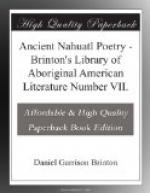NOTES FOR SONG IV.
A poem of unusually rich metaphors is presented, with the title “A Song of the Mexicans, after the manner of the Otomis.” It is a rhapsody, in which the bard sings his “faculty divine,” and describes the intoxication of the poetic inspiration. It has every inherent mark of antiquity, and its thought is free from any tincture of European influence.
2. miahuatototl, literally, “the corn-silk bird,” miahua being the term applied to the silk or tassel of the maize ear when in the milk. I have not found its scientific designation.
6. poyomatl; the poyomatli is described by Sahagun (Hist. de la Nueva Espana, Lib. X, cap. 24) as a species of rose, portions of which were used to fill the cane tubes or pipes used for smoking. He names it along with certain fungi employed for the same purpose, and it probably produced a narcotic effect.
NOTES FOR SONG V.
From the wording, this appears to be one of the lost songs of Nezahualcoyotl, either composed by him or sung before him. (See the Introduction, p. 35.) It is a funeral dirge, dwelling on the fact of universal and inevitable death, and the transitoriness of life. There is in it no hint of Christian consolation, no comfortable hope of happiness beyond the grave. Hence it dates, in all likelihood, from a period anterior to the arrival of the missionaries.
1. tonequimilol; I take this to be a derivative from quimiloa, to wrap up, especially, to shroud the dead, to wrap the corpse in its winding sheets, as was the custom of the ancient Mexicans. The word, however, seems an archaic form, as it does not lend itself readily to analysis.
The expression in Dios, I explain as in the note to II, 1, and do not consider that it detracts from the authentic antiquity of the poem.
2. yoyontzin; on the significance of this appellation of Nezahualcoyotl, see Introduction, p. 35.
3. ti Nezahualcoyotl; “thou Nezahualcoyotl.” The princely poet may have addressed himself in this expression, or we may suppose the song was chanted before him.
5. Nopiltzin; the reference is to Quetzalcoatl, the famous “fair God” of the Nahuas, and in myth, the last ruler of the Toltecs. See D.G. Brinton, American Hero Myths (Philadelphia, 1882). The term means “my beloved Lord.” On Tezozomoc, see Introduction, p. 35.
6. The text of the latter part or refrain of verses 5 and 6 is corrupt, and my translation is doubtful.




